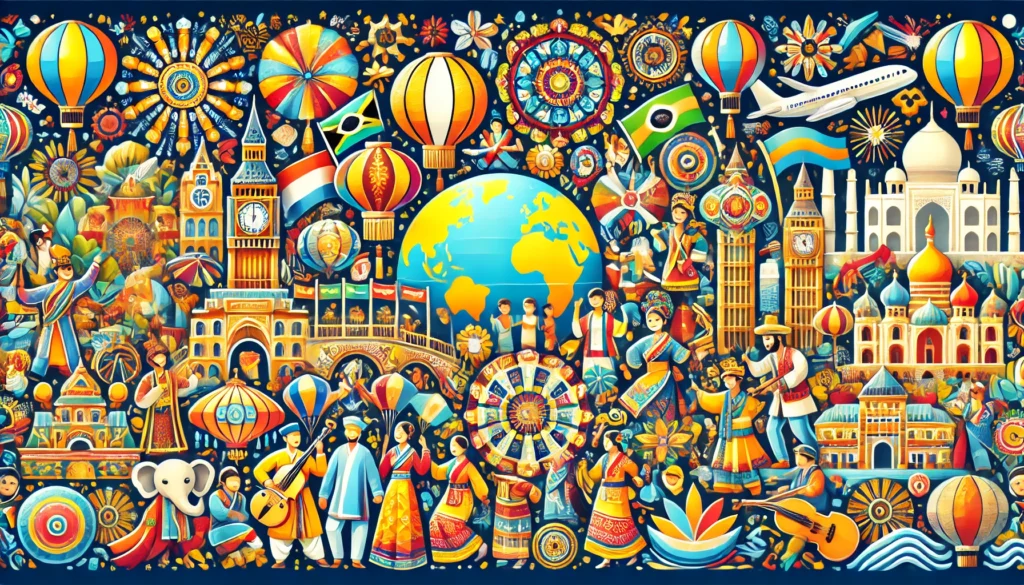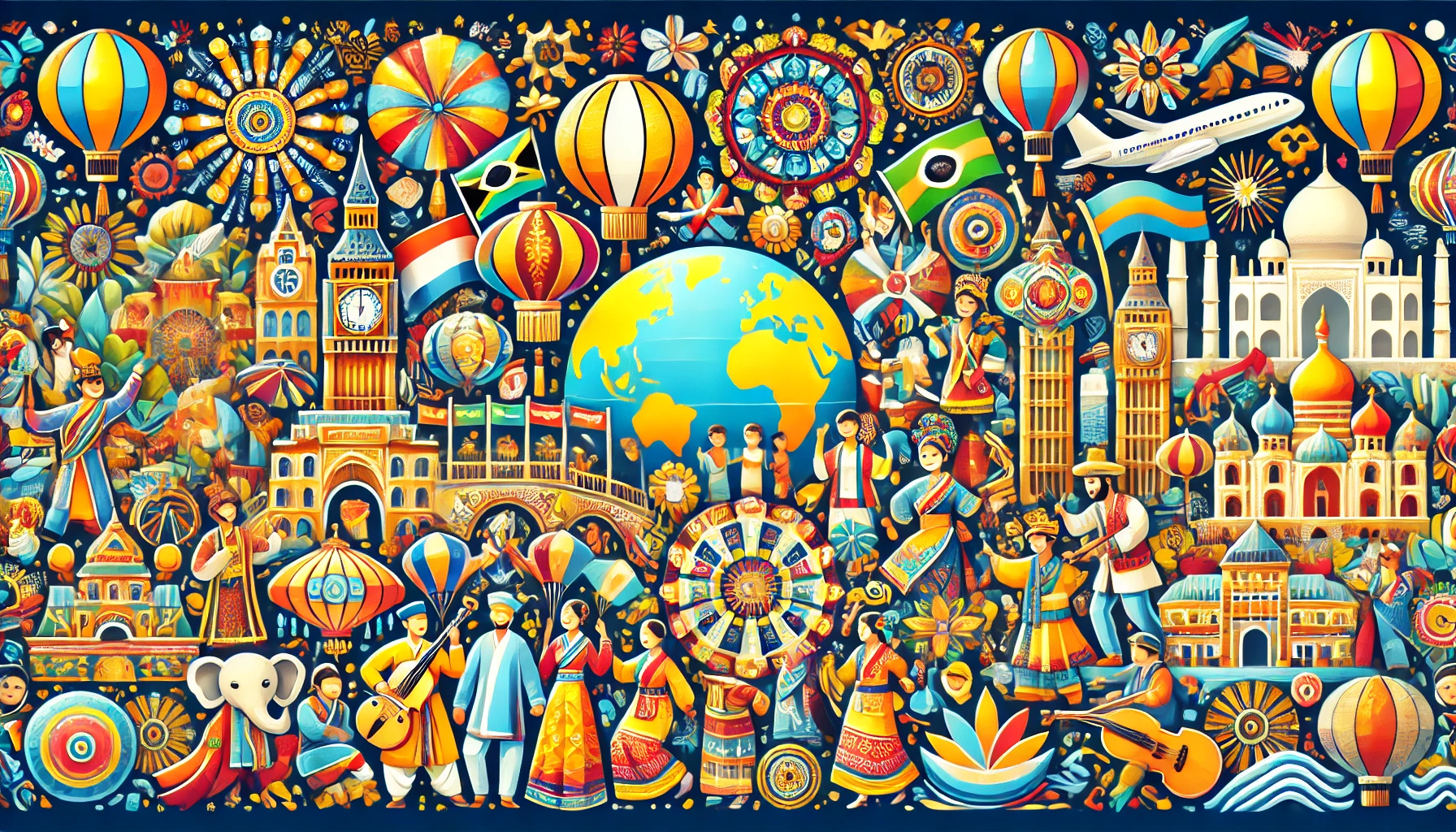Celebrating Diversity: The Importance of Festivals All Over the World 1300 Words
Introduction
Festivals are social events that unite people with a spirit of cohesion, happiness, and enjoyment and cultural appreciation between different groups.
These have historically, religiously, socially, and economically marked the change in seasons and mythological milestones as well as beliefs based on culture.
Festivals have served to help preserve the traditions and promote cultural identity building through continuous facilitation of the spread of gladness.

Why Festivals?
Cultural Heritage
Festivals help in the preservation of the cult ways and their traditions to be passed on to future generations.
They become a channel through which different identities, beliefs, and practices in their communities are not put to an end.
Social Cohesion and Unity
Festivals enhance family reunions and relationships between friends, neighbours, and a larger community
More festivals enhance the values of sharing, charity, and even forgiveness that make people more sympathetic.
Economic Benefits
Festivals attract tourism; therefore, they, indirectly enhance local economies as well as provide employment opportunities.
Smaller scale businesses, artisans, and traders sell more products during holidays.
Religious and Spiritual Significance
Religious festivals are supposed to be for the sake of worshiping deities to honour the activities of the gods and to aid in the renewal of faith for the devotees.
This way people reflect on their life, repent and thank as an expression of gratefulness, and update their resolutions to spiritual values.
Main Celebrations Around the World
Diwali (India)
Overall Description:-
This festival is known as the “Festival of Lights.” Hindus, Jains, Sikhs, and some Buddhists celebrate this festival.
Importance:-
It marks the victory of light over darkness, as well as good over evil and has been celebrated, tied to the return of Lord Rama to Ayodhya.
Celebrations:-
Incorporates lighting oil lamps, bursting fireworks, family feasts, as well as sweets exchange.
Economic Importance:-
Mega level boost to the retail industry as it sells gifts, decorations, sweets, and clothes.
Christmas (International)
Description:-
Christmas falls on December 25th, it marks the birthday celebration of Jesus Christ.
Importance:-
Hails festive themes of happiness, peace, and good will which unites families.
Gatherings:-
Decoration of Christmas tree, attending church masses, giving gifts, and sumptuous home dinners.
Economic Effect:-
Global retail is enhanced with this celebration through gift-giving, decorating, and other special events, mainly in the West.
Chinese New Year (China and Chinese communities all over the world)
Deasil:-
Or the Lunar New Year it marks the beginning of the lunar calendar.
Importance:-
A date of reunification besides wishing for prosperity in the coming year that way people remember their ancestors.
Celebrations:-
Fireworks, dragon dances parades, red packets also known as hongbao with money inside them and traditional food.
Economic Impact:-
Strong sales for retailers, mostly on decorations, gifts, and travel.
Eid al-Fitr and Eid al-Adha (Muslim Communities Worldwide)
Overview:-
Eid al-Fitr marks the ending of Ramadan and Eid al-Adha marks the willingness of Ibrahim to sacrifice his son.
Importance:-
Eid al-Fitr is about spiritual renewal and victory during a month of fasting; while Eid al-Adha talks about sacrifice and submission to God
Celebrations:-
Family gatherings, prayer, charity to those in need, and festive meals.
Economic Impact:-
Inflation of local markets as people are spending more on food, clothes, and charitable donations .
Hanukkah (Among Jewish Communities Worldwide)
History:-
The Festival of Lights has therefore become named as Hanukkah, an event marking the rededication of the Second Temple in Jerusalem.
Importance:-
It is a festival of human endurance, trust, and miraculous oil for eight days.
Observations:-
Lighting the menorah, playing the dreidel game, giving gifts, and eating fried foods.
Economic Impact:-
It raises the markets, especially in the US, considering gift spending, food, and decorations.
Holi (India)
Description:-
“Festival of Colors” – Holi is the festival denoting the arrival of spring and good triumphing evil.
Importance:-
It reveals the message of unity, love, and glee; following the Hindu folklores of Lord Krishna and Prahlad.
Celebration:-
Throw colored powders, dance, sing, and enjoy food during the celebration.
Economic Impact:-
Increased tourism and sales of colors, sweets, and drinks in India.
Thanksgiving USA and Canada
Description:-
Thanksgiving is a jubilant festival in the United States in November and in Canada in October. Traditionally it marked the harvest and the good wishes of the year.
Importance:-
It is time to give thanks and enjoy feasting with loved ones.
Ritual purification:-
Family reunions, feast days with turkey and parades.
Economic impact:-
Major shopping holiday in the United States. Day after Thanksgiving has Black Friday sales.
Oktoberfest- Germany
Introduction:-
It is a folk festival carried out every year in Munich for 16 to 18 days and marks the culture and traditions of Bavaria.
Significance:-
It was initially carried out way back in 1810 on the marriage of the Bavarian Crown Prince Ludwig.
Commemorations:-
The celebration includes the beer tents, parades, pretzels with sausages and folk music.
Economic Importance:-
Tourism has significantly increased great revenues as millions of travelers around the world come to this place.
Carnival (Brazil and Other Countries)
Origin:-
Carnival is one of the annual pre-Lenten festivals, observed most colorfully in Rio de Janeiro.
Importance:-
It is a celebration that blends local, European, and African cultures, which is known for the vibrant costumes and samba parades.
Tradition:-
Parades, music, dancing, bright colors.
Economic Importance:-
Tourism will increase since the foreign guest also contributes to the revenues of the country.
Easter (Christian Communities Everywhere)
Meaning:-
This is a celebration in the Christian communities during spring festivals; marking the resurrection of Jesus Christ.
Significance:-
This festival represents the hope and regeneration and the victory of life over death.
Activities:-
Congregational masses, Easter egg hunting, family reunions, and feasts.
Economic Impact:-
People spend more on decorations, chocolates, and other products of Easter.
Day of the Dead (Mexico)
Significance:-
This festival is the day to honor the dead relatives and the family members.
Observed on November 1-2.
Importance:-
It is a belief that death is a fundamental aspect of life and the animistic belief of the dead souls returning to their families.
Ceremonies and celebrations:-
Creating altars (ofrendas), decorating the cemeteries, and traditional food preparations such as pan de muerto.
Economic gains:-
It helped boost the local economy, particularly tourism since most tourists want to venture deep into Mexico.
Vesak (Associations of Buddhists Around the World)
Definition:-
Also called Buddha Purnima, Vesak celebrates the birth, enlightenment, and death of Buddha .
Importance:-
The day is for Buddhists to reflect on what Buddha said with regard to kindness, non-violence, and wisdom.
Practices:-
Meditation, almsgiving, decorating temples, and freeing captive animals.
Economic Significance:-
The low economic intensity of activities surrounded with charity and austerities rather than consumption
Pongal (South India)
Description:-
Four-day harvest festival in Tamil Nadu.
Importance:-
Sacrificing to the Sun God and other features of nature such as cows, etc. for good harvests.
Activities:-
Steaming rice in fresh utensils, decorating cows, village events.
Economic Importance:-
Increases the sale of farm produces, food, cloth and ornaments.
Kwanzaa (USA)
Governing Principles:-
A seven-day’s series of activities towards appreciating African culture, occasioned during December 26th to New Year’s Day
Significance:-
Nurtures virtues like unity, self-determination and group economics.
Celebrations:-
With the candles and the kinara, reunions by the family, sharing stories and exchange of gifts.
Economic Impact:-
Little commercial activity is still a culture to heritage.
Festivals are thought to be of immense cultural, social, and economic importance because they are unifying forces for communities all around the world.
Festivities make people understand their own culture much better and the customs of other people.
Festivals concentrate on peace and unity among people, but they also respect the diversities of cultures in each other’s cultures-this underlines that the human element is common on both sides of the border.
Also Read:- Government of India Act, 1935 – Pathway to Independence: The Profound Impact

